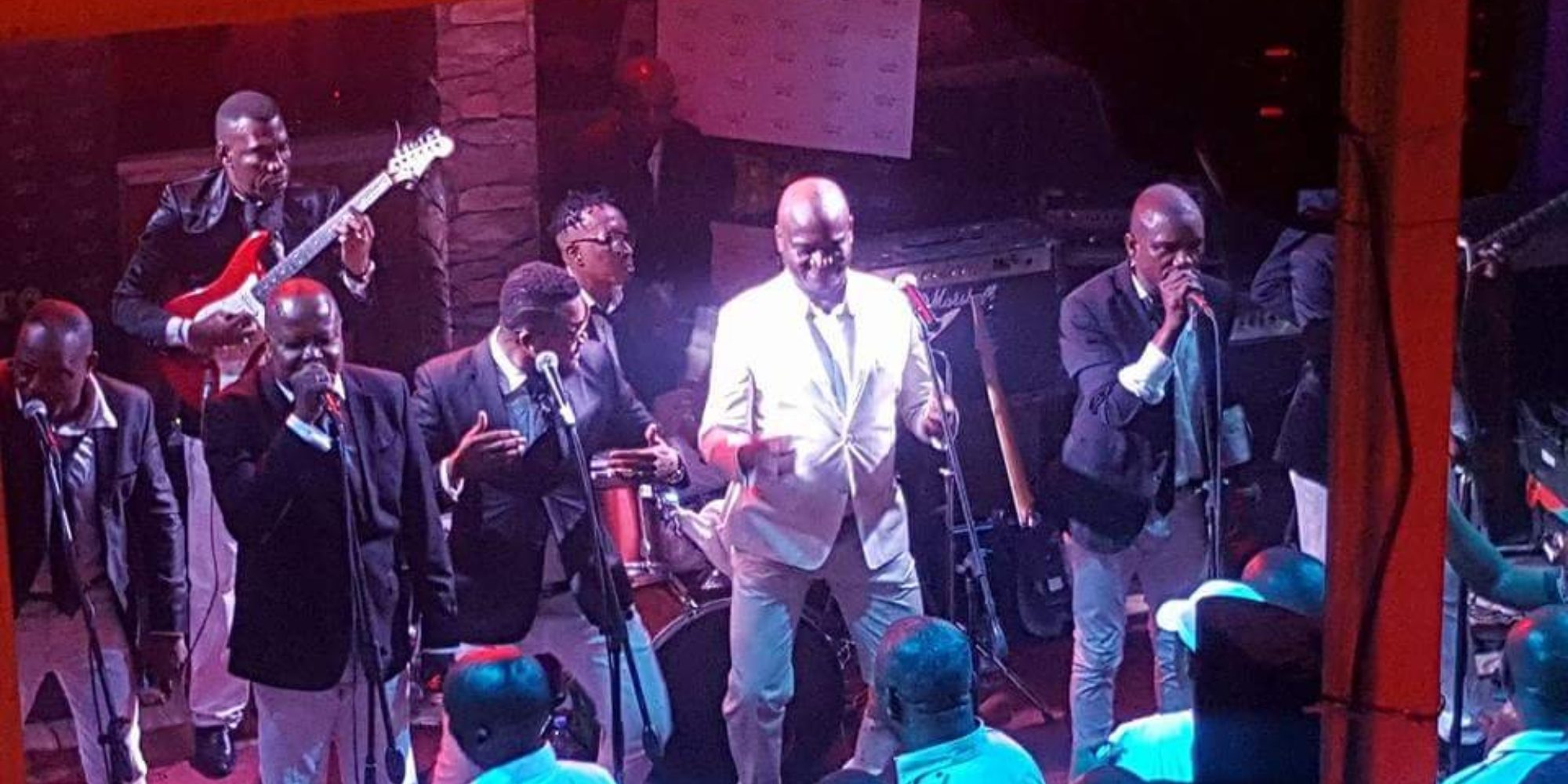Congolese vocalist and songwriter Nyoka Longo is an original member of one of Africa’s most consequential dance bands: Zaïko Langa Langa. Founded in 1969, this band of students, schooled in classic rumba and emboldened by the spirit of the era’s rock ‘n’ roll, introduced a new, high-energy, electric guitar-focused take the Congolese sound. The music has never been the same since. When Afropop first visited Kinshasa in 1985, Zaïko ruled the roost—not that there weren’t many competitors. When we returned in 1987, we witnessed the band’s celebration of 18 years, with original members Papa Wemba, Evoloko Joker and guitarist Manuaku Waku in the lineup.
All these years later, Zaïko is getting ready to celebrate 50 years on the scene. And this month, Nyoka Longo and the band’s current lineup is touring the U.S. for the first time ever. Remaining shows include:
-Nov. 17, Los Angeles, CA
-Nov. 27, (le) Poisson Rouge, New York, NY
-Dec. 8, Montreal, Canada
-Dec. 15, Toronto, Canada
-Dec. 29, Dallas, TX
-Dec. 31, Montreal, Canada
In advance of the New York show, Banning Eyre reached Nyoka Longo by telephone from Chicago. Here’s their conversation.
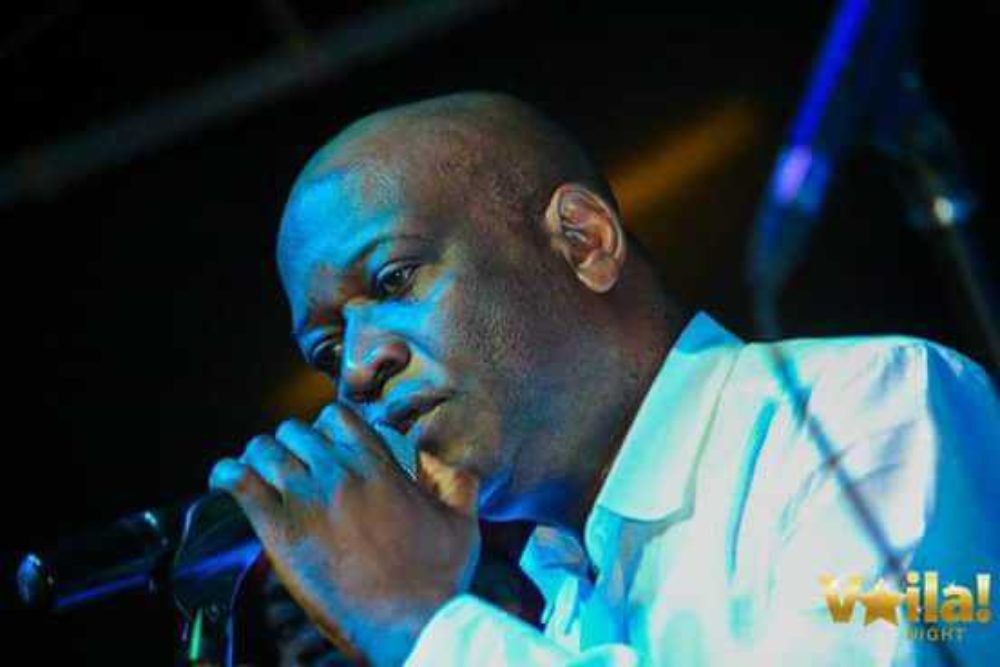
Banning Eyre: Nyoka Longo, you probably don't remember this, but Sean Barlow and I were in Kinshasa in 1987. We saw you doing the 18th anniversary of Zaïko Langa Langa. Papa Wemba was there with you, and Manuaku Waku on guitar. It was my first time in Africa. And I'll never forget it.
Nyoka Longo: Wow. That was a long time ago. I see.
Well, it's great to speak with you again, all these years later. For some of our listeners who may not know the band’s story so well, tell us what was special about Zaïko Langa Langa.
It's the work. It's the work. Next year, the band will be 50 years old. People are still with Zaïko, so we keep going, for everybody.
When you started, there was a movement beyond the rumba of Grand Kalle and Franco, and the big-band international sound of Tabu Ley and Afrisa horn section and stage show. Then, in the late 1960s, Zaïko Langa Langa comes along with something new. What was that?
In the beginning, we were not out to play the rumba in the school of Franco or the school of Kabasele, Grand Kalle, and Tabu Ley. We created our own school without all the instruments of the past, specifically the trumpets and saxophones—the horns. We just had our guitars and our voices. And we added the drums with a particular rhythm and tempo. It wasn't like the rhythms of Tabu Ley, which he had taken from James Brown and Wilson Pickett. We introduced a different rhythm which we call macini ya kauka [literally “the machine of Kauka,” a Kinshasa neighborhood]. It was a rhythm introduced by our drummer, Meridjo.
And that's a rhythm that is played today by many groups, including Kassav and Tabou Combo from Haiti, and also many groups in Africa. That's why we call Zaïko Langa Langa the third generation of Congolese music, because we introduced many things into Congolese rumba.
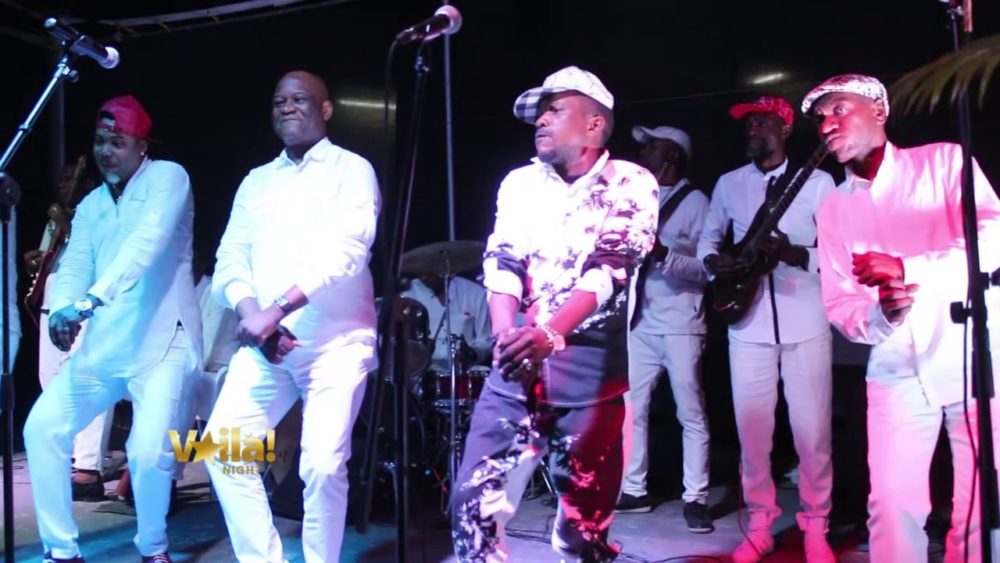
Absolutely. The third generation. About that rhythm you mentioned, macini ya kauka, I understand there's a story behind it. Where did that come from?
It came from a trip we took between Congo-Brazzaville and Point Noir in Gabon. We couldn't sleep that night, and we kept noticing the movement of the train and the sound it made: cha-ka, chou-kou, cha-ka, chou-kou… And Evoloko asked Meridjo if he could imitate that sound on his drums. That's how it started.
There's a book that will be coming out for the celebration of 50 years of Zaïko . The whole history of the band will be there. I am a co-author. The stories of everyone are there, of Papa Wemba, Evoloko, Manuaku, everyone.
Fantastic. Can't wait to see that. I know the history gets complicated with two different groups using the name at one point, and various split-offs. But talking about your group, has it continued through all these years? Or was there a time when you took a break from performing and recording?
For sure. For sure. We have always continued. There was never a break. When we speak about the history of Congolese rumba, everyone looks at Kinshasa. We spent seven years in Europe. We didn't play in Kinshasa during those years, that's why everyone thinks we were silent.
I see. And what were the years spent in Europe?
That was from 2002 until 2009.
So the group you're bringing here now, how many are original members of the band, from your generation?
For my generation? I'm the only one. Meridjo lives in Belgium now. Bapuis, the bass player, is in Paris. Manuaku lives between Switzerland and Kinshasa. So I'm the only original member, but we have these younger members who came along in the 1980s and '90s. Doudou Adoula is there. Gokule the drummer is there.
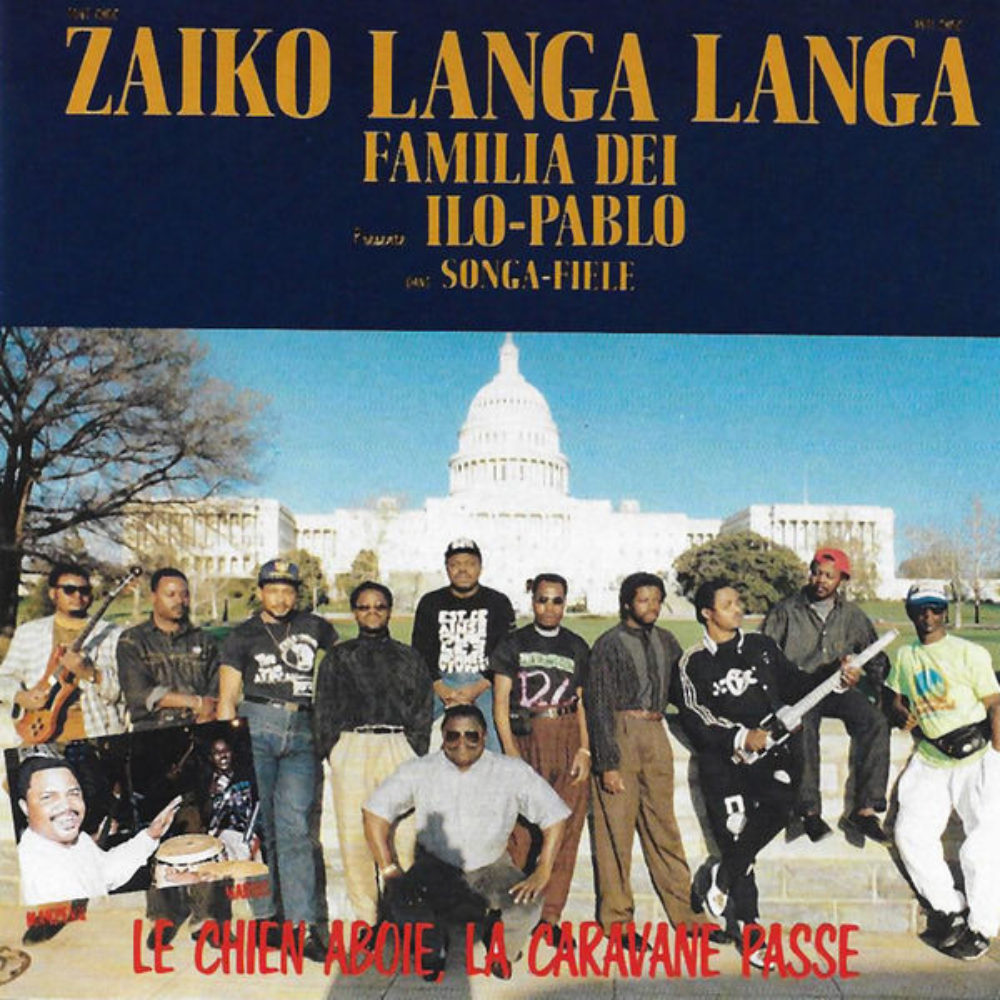
I remember Manuaku very well. He was one of the first guitarists I wrote about for Guitar Player magazine, back in 1988. So I have a special feeling for him. I've seen some of your videos. The team looks fantastic, as ever. I want to ask you about the dances you guys have invented. I know that dances have been a big part of the popularity and the phenomenon of Zaïko . So when you perform now, do you have new dances, or do you give the audience the hits from the past?
Well, with us, every two or three years we have a new dance that we create. So at our concert in New York, people will discover the new music of Zaïko and a new dance.
What's the scene like in Kinshasa these days? I certainly remember how it was when Sean Barlow and I first went there in 1987. There was just so much music happening, especially in Matonge--so many bands, so many clubs. What's it like now?
Well, you know the Congolese people, especially in Kinshasa, are people who love culture. They love music. They love sports. Nothing has changed there. But life isn't the same as before. Things have gone down some. But people still go out. They go out.
And are there still a lot of bands active in those small clubs?
Yes, there are still a lot of groups in Kinshasa. But to be a group like Zaïko who can play every Friday, Saturday and Sunday, that's not an opportunity given to every group. Not every group can do that. But there are others who do: Wenge Musica. Koffi Olomide... And there are younger groups that play a lot in Kinshasa like Fally Ipupa. J.B. Mpiana is still there. All the Wenge musicians are still there.
Sure. These are big groups. Do groups on this level, these groups you've just named, perform in halls? Stadiums? What kinds of venues do these top groups perform in?
Nothing has really changed there. We played big halls and big events. We play at the Intercontinental Hotel. That's a new hotel by the Congo River, which you'll see if you come to Kinshasa. And there are other large spaces. As for stadiums shows like we had in the past, there aren't any more of those. The big place to play now is the Parliament.
Zaïko began as the music of youth. You guys started out as students, and really shook things up—changing the sound, changing the dancing. It was kind of revolution.
Yes. That's true.
So now after all these years, who is the audience today for Zaïko ?
Today, everybody likes Zaïko. It's not just the people from our generation. A lot of young people listen to Zaïko, and the old ones too.
Good to hear. Of course, Congolese music has changed. You identified the band with a Third Generation. These days people are talking about a fifth and even sixth generation.
Yes. I've always said that Zaïko were the leaders of the Third Generation. In a sense, there has never really been a fourth generation of Congolese music. Let me explain. The first generation of Congolese music were our griots: Papa Wendo, Bowane, a few others. Papa Wendo, our griot, started out playing with just an acoustic guitar. And then came along Grand Kalle who modernized the music to be played by a band. So that was the First Generation. The Second Generation came with singers like Josky, Sam Mangwana, Bavon Marie-Marie in Franco’s band. Each generation brings something new to Congolese music. First Papa Wendo, our griot, created this Congolese rumba, and then Grand Kalle modernized it with horns and other instruments. Then Bavon Marie-Marie changed things again. He revolutionized the music into soukous, with the seben section [the fast dance section at the end of a song with lots of guitar work and shouted “animation.”] That was Bavon Marie-Marie and others.
Then with our generation, the Third Generation, what Zaïko brought was the drums and the rhythm of the seben. And Manuaku brought his creativity on guitar to the seben. It was different from Dr. Nico, Franco or Bavon Marie-Marie. and that's what everyone plays today. And the drumming today? That's Zaïko . As for the development of Congolese music, yes, our children, those who followed us, they also brought new things to Congolese music. So now we talk about the Fourth Generation, and the Fifth Generation. But it still Congolese music. It hasn't changed that much.
These days, there are a lot of Congolese artists based in Europe, including those who were born outside the country, such as Maitre Gims in Paris, a huge star. So this is yet another evolution brought by people who did not grow up in Kinshasa, but they inherited the music from their parents?
It's true, and they have a lot of new technology, but they're still basically playing rumba, the rumba that was created by Grand Kalle and Zaïko and the rest of us. It’s still Congolese rumba. Me personally, I've never agreed with the idea of mixing Congolese rumba with other styles.
And yet, all these new styles grew out of rumba. I'm thinking of coupé decalé in Ivory Coast or even the new Afrobeats from places like Nigeria. They all contain that Congolese rumba beat within them. It’s a progression.
Congolese music is the source for so much African music. A lot of people came from Ghana, Benin, Nigeria, they came to Kinshasa, maybe for a vacation, and they brought Congolese music back home with them. If you listen to Bembeya Jazz in Conakry, Guinea, you hear our Congolese band African Jazz in it. You hear that influence. If you listen to just about any popular music in Africa, you will always hear that influence of Congolese rumba.
Yes, indeed. It will outlive us all.
Yes, we are passing on something very important to our children, something that came from our parents. Something from long ago to amuse them.
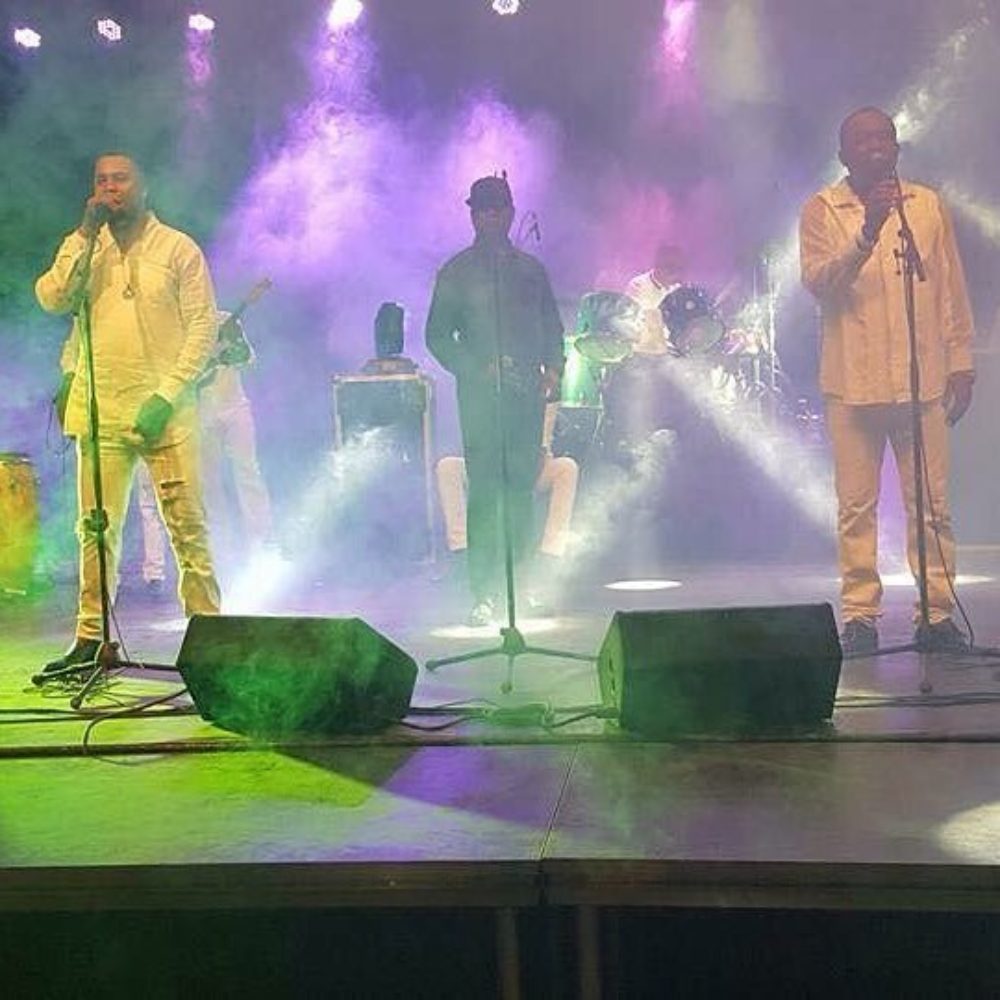
Here's another question. Since the beginning, Congolese music has always been about enjoyment, ambiance, dancing. It has never really been political music. But I've heard it said that recently, with so many Congolese living in Europe and other places outside the country, there's a new demand from these people for the music to be more engaged. They are not happy with politics in Congo. And they want musicians to talk about this more. I've heard that this is become a problem for some artists. They are being pressured to be more political than they would like. What's your sense of this dynamic?
This dynamic is valuable. It's valuable in the sense that Congolese people, and Africans in general, have been awakened. They've been awakened to certain dictatorships. They become unhappy and they leave Africa. But if they want to fight culture, that is not normal. If you take a position to fight a certain politics, certain people in power, you will offend certain people who benefit from that power. If you're going to fight, you can't just generalize about everybody.
But would you agree that things have changed in recent years?
In terms of politics? Or in terms of culture?
Both. And how they interact.
Well, everything goes with politics, the economy… Even culture is affected by politics. If you have good politics, and the country is going in a good direction, everything works very well.
O.K. We'll come back to music. How many musicians are you bringing to New York?
Sixteen musicians. We have two lead guitarists, one guitarist in the middle…
Mi-solo.
Yes. And then a rhythm guitarist, a bassist, a drummer, a percussionist. Four singers. Two animateurs. These days in Africa, they call them DJs. And we have two. Then there's a keyboard. It's a big team.
I have seen in the videos the way you and the other singers dance together. Are there also dancers in the ensemble?
No, no, no. We couldn't bring any dancers. It's very expensive.
I understand. And we’re very lucky to see such a large group as you've brought. That doesn't happen so much here anymore.
It's not everybody who can tour without a sponsor. That's why you don't see so much rumba here in America.
Amen. We remember when that used to see a lot more. By the way, when was the last time Zaïko Langa Langa played in the United States?
Actually this is the first time we played in the United States. We toured in Canada in 1987. Montréal, Toronto, Ottawa.
Wow. But this is your first time here?
Our first time.
Fantastic. And what about recordings? Have you got a new album?
Yes. We've been working on it. It will come out next year.
And how many records does Zaïko have? It must be a very large number.
Oh yes. It's like asking Franco or Tabu Ley how many albums they have. I can't even tell you. It's a lot of albums. A lot of songs.
We will be looking for you in New York.
Thanks very much.
Safe travels.
Related Audio Programs









